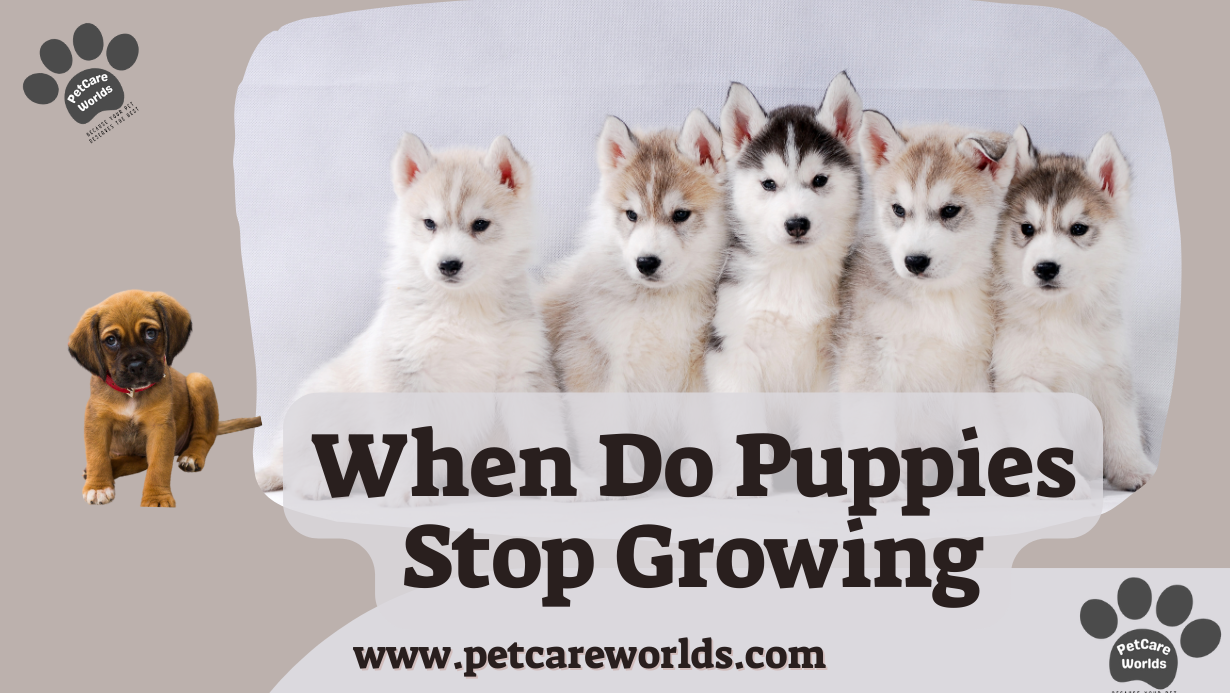When do puppies stop growing? This question crosses the mind of every pet parent as they watch their tiny furball transform day by day. From those clumsy first steps to bounding across the yard with endless energy, puppies grow at a fascinating pace. But did you know that the timeline isn’t the same for every breed? Small breeds mature much faster than their larger counterparts, while giant breeds can take up to two years to reach full adulthood. Understanding these growth stages is not just interesting—it’s essential for providing the right care during their formative years. So, are you ready to uncover the secrets behind your puppy’s journey to adulthood?
When Do Puppies Stop Growing?
Puppies grow at different rates, and the timeline depends on their breed and size. Small breeds typically stop growing around 9 to 12 months, while larger breeds may take up to 18 months. For giant breeds, the journey can last even longer—up to 24 months before they reach full maturity. Growth isn’t just about size; it includes bone, muscle, and behavioral development. Understanding this timeline helps you meet your puppy’s unique needs during these crucial stages.
The Importance of Understanding Growth Stages
Knowing your puppy’s growth stages is key to giving them the best care. Each stage has unique physical, nutritional, and behavioral needs. Properly supporting them during these phases can prevent health issues and ensure they grow into healthy, happy adults. When do puppies stop growing
- Growth isn’t just about size; it’s about bones, muscles, and organs developing at the right pace.
- Missing critical stages can lead to nutritional deficiencies or behavioral challenges.
Why Growth Stages Matter
Puppies grow rapidly, but their development is more than just physical. Here’s why understanding growth stages matters: When do puppies stop growing
- Health Monitoring: Growth patterns can highlight underlying health issues.
- Proper Nutrition: Each stage requires different levels of calories, vitamins, and minerals.
- Behavioral Shaping: Early stages are vital for training and socialization.
Knowing these stages helps you adapt to their changing needs.
How Growth Stages Affect Care
Your care approach should change as your puppy grows:
- Feeding: Puppies need specific nutrients to support bone and muscle development.
- Exercise: Overexercising young puppies can harm their growing joints.
- Training: Early stages are ideal for teaching commands and building habits.
Providing the right care at each stage sets the foundation for a strong and happy adult dog.
Growth Differences Between Small and Large Breeds
Not all puppies grow at the same pace. Small breeds mature faster, while larger breeds take their time. This affects their care in many ways: When do puppies stop growing
- Small breeds often stop growing by 12 months.
- Larger breeds may take up to 18 months or longer.
- Nutritional needs differ—large breeds require controlled diets to avoid rapid growth that can harm their joints. When do puppies stop growing
Small Breeds’ Growth Timeline
Small breeds like Chihuahuas and Dachshunds grow quickly:
- By 6 months, they reach about 75% of their adult size.
- Growth typically stops around 9 to 12 months.
- They require fewer calories than larger breeds but still need nutrient-dense food.
Large Breeds’ Growth Timeline
Large breeds like Labradors and German Shepherds grow more slowly:
- By 6 months, they are around 50% of their adult size.
- Full growth may take up to 18 months.
- Balanced nutrition is critical to prevent joint and bone issues.
What About Giant Breeds?
Giant breeds, such as Great Danes or Saint Bernards, follow an extended growth timeline:
- By 12 months, they may still be only 70% grown.
- Full maturity can take 18 to 24 months.
- Controlled feeding is essential to avoid rapid weight gain that could strain developing bones.
Supporting these massive pups requires patience, proper nutrition, and regular vet checkups.
Key Growth Stages of Puppies
Puppies go through distinct stages as they grow. Each phase is crucial for their physical and emotional development. Understanding these stages helps you provide the best care and support.
The Neonatal Stage (Birth to 2 Weeks)
This is the earliest stage of life. Puppies are completely dependent on their mother for survival.
- Eyes and ears are closed—they rely on touch and smell.
- Growth is rapid; they double their birth weight by the end of this stage.
- Warmth, food, and comfort are the primary needs.
The Transitional Stage (2 to 4 Weeks)
This is when puppies start exploring their world. When do puppies stop growing
- Eyes and ears open, allowing them to see and hear.
- They begin to crawl, stand, and wag their tails.
- Early social behaviors, like barking, start to appear.
The Socialization Stage (4 to 12 Weeks)
This stage shapes a puppy’s future behavior. It’s critical for their mental and emotional development.
- Puppies learn to interact with humans and other animals.
- Exposure to different environments builds confidence.
- Start basic training, like housebreaking and leash walking. When do puppies stop growing
Developing Immunity
Puppies receive initial immunity from their mother’s milk.
- At 6 to 8 weeks, vaccinations become essential to protect against diseases.
- Regular vet visits ensure their health during this vulnerable period.
Early Training and Habits
The best time to introduce:
- Crate training: Builds independence and security.
- Basic commands: Reinforce positive behaviors.
- Socialization activities: Help them adapt to various stimuli. When do puppies stop growing

The Juvenile Stage (3 to 6 Months)
Puppies become more active and curious during this stage.
- Teething occurs, so provide chew toys to protect furniture.
- They test boundaries and develop stronger personalities.
- Consistency in training is crucial to shape behavior.
Rapid Growth in Bones and Muscles
Puppies experience a growth spurt.
- Provide balanced diets rich in calcium and protein.
- Avoid overexertion to protect developing joints.
Nutritional Needs
At this stage, puppies need:
- High-calorie diets to support their growth.
- Frequent meals—usually three times a day. When do puppies stop growing
The Adolescence Stage (6 to 18 Months)
This is the final stage of puppyhood. Growth slows, but behavioral changes emerge.
Slower Growth in Large Breeds
Larger breeds, like Great Danes, grow more gradually.
- Full maturity may not occur until 18 to 24 months.
- Controlled exercise and proper diets prevent overgrowth issues.
Behavioral Maturity
Adolescence brings new challenges:
- Puppies test their independence, so consistent training is key.
- Social behaviors stabilize, reflecting their adult temperament.
- Patience and positive reinforcement help navigate this phase.
Factors Influencing Puppy Growth
A puppy’s growth depends on multiple factors. Understanding these ensures they grow into healthy adults. When do puppies stop growing
Genetics and Breed Size
Genetics play a major role in growth.
- Small breeds reach maturity faster.
- Large and giant breeds take longer to grow.
- Mixed-breed puppies’ growth can be harder to predict.
Nutrition and Diet
A proper diet is essential for healthy development.
- Provide high-quality puppy food rich in essential nutrients.
- Avoid overfeeding; it can lead to obesity.
- Portion sizes should adjust as your puppy grows.
Exercise and Activity Levels
Balanced activity promotes growth.
- Overexertion can harm developing joints in large breeds.
- Regular play helps build strong muscles and bones.
- Mental stimulation aids emotional growth.
Health Issues and Veterinary Care
Health problems can impact growth. When do puppies stop growing
- Parasites or illnesses can stunt development.
- Regular vet visits ensure any issues are addressed early.
- Vaccinations and deworming are critical.
Signs Your Puppy Has Stopped Growing
Knowing when your puppy has reached full size can guide their care.
Physical Signs
Physical indicators of growth completion include:
- Steady weight: No rapid changes in size.
- Proportional body shape: Legs and body align with breed standards.
- Adult teeth: Teething is complete. When do puppies stop growing
Behavioral Signs
Behavioral shifts signal maturity. When do puppies stop growing
- Calmer demeanor: Less hyperactivity compared to puppyhood.
- Consistent habits: Potty training and obedience are solidified.
- Reduced need for naps: Energy levels stabilize.
How to Support Your Puppy’s Growth Journey
Providing the right support ensures a healthy development process.
Choosing the Right Food
Nutrition is the foundation of growth.
- Choose age-appropriate dog food for each stage.
- Consider breed-specific formulas for optimal benefits.
- Consult a vet for dietary adjustments if needed.
Regular Health Checkups
Routine vet visits prevent and address health concerns.
- Schedule monthly checkups during the first year.
- Monitor weight and height to track progress.
- Address dental health and joint development.
Providing a Safe and Stimulating Environment
A secure home supports emotional and physical growth. When do puppies stop growing
Provide consistent socialization to build confidence.
Use puppy-proofed spaces to prevent accidents.
Offer toys for mental stimulation and play. When do puppies stop growing

when do puppies stop growing table
Here’s a helpful breakdown of growth timelines based on breed size:
| Breed Size | Growth Period | Key Milestones |
|---|---|---|
| Small Breeds | 8-12 months | Reach full size quickly; earlier maturity. |
| Medium Breeds | 12-15 months | Gradual growth; balanced muscle development. |
| Large Breeds | 15-18 months | Longer growth phase; watch for joint health. |
| Giant Breeds | 18-24 months | Slowest growth; requires special care for bones and joints. |
“Every puppy grows at its own pace, but understanding their timeline ensures a healthy and happy transition to adulthood.”
when do puppies stop growing FAQ
Q1: At what age do puppies stop growing?
Most puppies stop growing between 8 to 24 months, depending on their breed size. Small breeds mature faster, while giant breeds take longer.
Q2: Do all puppies grow at the same rate?
No, growth rates vary. Genetics, breed size, nutrition, and overall health play a significant role in determining how quickly a puppy grows.
Q3: Can I tell if my puppy has stopped growing?
Look for physical and behavioral signs, such as stable weight, no increase in height, and consistent energy levels.
Q4: How can I support my puppy’s growth?
Provide a balanced diet, regular veterinary care, and safe exercise routines. Tailor their care based on their breed size and needs.
Q5: Why is my puppy still growing past 18 months?
Large and giant breeds, like Great Danes, can take up to 24 months to fully mature. It’s normal for these breeds to have an extended growth phase.
Q6: What happens if my puppy’s growth seems stunted?
Consult a veterinarian. Nutritional deficiencies, underlying health issues, or genetics may be affecting their development.
Q7: Is there a difference between physical and behavioral maturity?
Yes, physical maturity refers to reaching full size, while behavioral maturity includes settled behavior, reduced playfulness, and social independence.
Conclusion
When do puppies stop growing? It depends on their breed and size, but most reach maturity by 8 to 24 months. Care during growth is key to their health.





